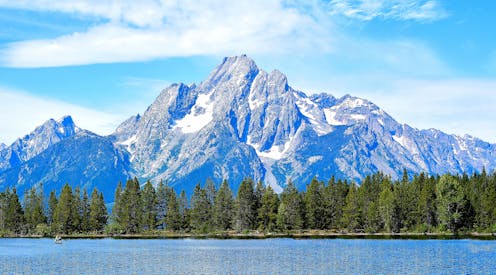how a meeting of bankers in a remote Wyoming valley could have consequences for us all
- Written by Amr Saber Algarhi, Senior Lecturer in Economics, Sheffield Hallam University

The economic world recently turned its attention to the resort of Jackson Hole, in a remote Wyoming valley. The annual economic policy symposium[1] of central bankers, policymakers, academics and financial gurus took place in this unlikely spot, producing outcomes that hold significant implications for economies worldwide.
This year’s focus on the effectiveness of monetary policy was timely, as countries grapple with economic challenges like rising living costs[2], high interest rates[3], a slowdown in hiring[4] and sluggish economic recovery[5]. Central banks are pivotal in responding to these challenges.
They play a huge role in keeping their countries’ monetary policy on track and serve as the linchpins of economic wellbeing. Their primary goals[6] include curbing price fluctuations, tempering interest rate surges, boosting economic growth and safeguarding the stability of both financial systems and currency markets.
As such, the decisions of central banks like the US Federal Reserve[7] (the Fed) bear significant weight. This is not only because they affect economic activity, but also because they can cause ripples far and wide in the interconnected global economy.
The Fed chair Jerome Powell grabbed the event’s spotlight with a speech[8] signalling a change in US monetary policy. In the address, he made one thing clear: the Fed stands ready to cut US interest rates in September.
Central bank independence
Even though the lessons learned from tackling the most recent inflationary surge lay at the heart of the speech, Powell also alluded to a crucial but sometimes overlooked point – the issue of central bank independence.
This is often taken for granted. But as Powell implied, in order to ensure a successful monetary policy through a sound central bank operation, independence from political influence is key[9].
However, not everyone supports this approach. Some argue that having a completely independent central bank removes an important economic tool from democratic control and gives unelected officials too much power[10]. In fact, the actions of monetary authorities[11] and the principle of central bank independence, in particular that of the Fed, has been challenged numerous times[12] – especially under the Trump administration[13].
Within this context, and with the US presidential election[14] looming, the debate over central bank independence becomes even more crucial.
US presidential candidates Kamala Harris and Donald Trump each have their own hopes for what the Fed will do with interest rates in September[15]. Both see the independence of the Fed very differently[16].
Harris, representing the current administration, most probably favours a swift reduction in rates. Lower rates could help businesses grow and might keep the economy from hitting a rough patch. She is also strongly against any proposal that gives the US president control over interest rate decisions, emphasising the importance of the Fed’s autonomy.
Trump, on the other hand, may have different views. He has suggested[17] that economic instability might sway undecided voters towards his camp. And he has openly declared that the US president should be able to have a say[18] on the Fed’s interest rate decisions.
However, these political preferences or the perceived effect of the Fed’s decisions on one party or the other[19] should not affect the central bank’s choices. There are a lot of good reasons for this.
When central banks are free to make decisions based on long-term economic needs rather than short-term political gain, they can implement policies that, though unpopular at first, benefit the economy over time.
Central bank independence is also important for enhancing credibility and stability in the financial system. When businesses and investors perceive central banks as impartial decision-makers, they are more inclined to trust them when they claim they act in the best interest of the economy.
Finally, being able to make independent decisions also enforces accountability, which can in turn prevent potential reckless decision-making. This is why maintaining independence is crucial.
Why Jackson Hole matters
So why are the decisions made at events like Jackson Hole important? Central bank decisions on monetary policies will affect the economic conditions for everyone, but perhaps none more than young people. From job searches and the salaries on offer to buying a house or paying back student loans, most aspects of their lives will be affected by policy moves.
Jerome Powell delivers his keynote speech for 2024 at Jackson Hole.Understanding the basics about central banking, monetary policy and global economic interdependence can help people make informed decisions and engage meaningfully in public debates on economic matters. In this context, young adults in particular have a vested interest in these policy discussions, as emerging voters and economic participants who can shape the future economic landscape.
Though the Jackson Hole gathering amid the beautiful Wyoming mountainscape might appear detached from everyday life, it addresses pivotal questions about maintaining economic stability and fostering prosperity in uncertain times.
Staying abreast of these matters is important because, given the fluid and interconnected nature of the global economy, the implications of decisions made at these events cascade through society.
And ultimately, they will affect everything from the price of a cup of coffee to the feasibility of owning your own home.
References
- ^ symposium (www.kansascityfed.org)
- ^ rising living costs (theconversation.com)
- ^ high interest rates (theconversation.com)
- ^ slowdown in hiring (theconversation.com)
- ^ sluggish economic recovery (theconversation.com)
- ^ primary goals (files.stlouisfed.org)
- ^ US Federal Reserve (www.federalreserve.gov)
- ^ speech (www.federalreserve.gov)
- ^ key (theconversation.com)
- ^ power (knowledge.wharton.upenn.edu)
- ^ monetary authorities (www.bis.org)
- ^ numerous times (www.lemonde.fr)
- ^ Trump administration (www.cnbc.com)
- ^ presidential election (www.cnbc.com)
- ^ September (www.theguardian.com)
- ^ differently (www.nytimes.com)
- ^ suggested (www.wsj.com)
- ^ have a say (www.cnbc.com)
- ^ one party or the other (www.nytimes.com)







